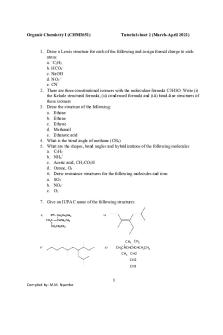Research Tutorial 2 PDF

| Title | Research Tutorial 2 |
|---|---|
| Course | Accounting Frame Work |
| Institution | Solomon Islands National University |
| Pages | 2 |
| File Size | 103.6 KB |
| File Type | |
| Total Downloads | 9 |
| Total Views | 143 |
Summary
tutorials solutions...
Description
RESEARCH TUTORIAL 2: RESEARCH BASIC CONCEPT AND TERMS 1. What is a theory? Provide an example to support your answer. The definition of a theory is an idea to explain something, or a set of guiding principles. Einstein's ideas about relativity are an example of the theory of relativity. The scientific principles of evolution that are used to explain human life are an example of the theory of evolution 2. What is a hypothesis? Please provide examples to support your answer. How can we reject or accept a hypothesis? A hypothesis is used to determine the relationship between two variables, which are the two things that are being tested. One variable is independent and is the cause of any changes in the outcome. The other variable is dependent and is the outcome itself. The American Heritage Dictionary defines a hypothesis as, "a tentative explanation for an observation, phenomenon, or scientific problem that can be tested by further investigation." This means a hypothesis is the stepping stone to a soon-to-be proven theory. For a hypothesis to be considered a scientific hypothesis, it must be proven through the scientific method. Like anything else in life, there are many paths to take to get to the same ending. Let's take a look at the different types of hypotheses that can be employed when seeking to prove a new theory. 3. What is theoretical framework? The theoretical framework only includes necessary information which means the information needed in the practical part. ... The thesis is clearly based on the theoretical framework and the practical study. The practical study is closely connected to the theoretical information and source literature. Sep 4. What conceptual framework?
A conceptual framework is a structure which the researcher believes can best explain the natural progression of the phenomenon to be studied (Camp, 2001). It is linked with the concepts, empirical research and important theories used in promoting and systemizing the knowledge espoused by the researcher (Peshkin, 1993).Jan 2, 2018 a conceptual framework as "the way ideas are organized to achieve a research project's purpose". Like football plays, conceptual frameworks are connected to a research purpose or aim. ... The formal hypothesis of a scientific investigation is the framework associated with explanation. 5. What is deductive reasoning? Please provide example to support your answer. It allows you to take information from two or more statements and draw a logically sound conclusion. Deductive reasoning moves from generalities to specific conclusions. ... If they're accurate, then the conclusion stands to be sound and accurate. Let's explore some deductive reasoning examples.
All dolphins are mammals, all mammals have kidneys; therefore all dolphins have kidneys. All numbers ending in 0 or 5 are divisible by 5. The number 35 ends with a 5, so it must be divisible by 5. 6. What is inductive reasoning? Please provide examples to support your answer. Inductive reasoning is the process of reasoning to a general conclusion through observations of specific cases. Induction involves looking for a pattern and then predicting a conclusion. Use inductive reasoning to predict the next three number in the pattern. Example #38 Pick any number and multiply the number by 6. 7. What are the sources of knowledge? This article identifies the sources from which one acquires knowledge or justified belief. It distinguishes the “four standard basic sources”: perception, memory, consciousness, and reason. A basic source yields knowledge or justified belief without positive dependence on another source. 8. What are the two approaches of research methodologies? There are different types of qualitative research methods like an in-depth interview, focus groups, ethnographic research, content analysis, case study research that are usually used. 9. Epistemology: the theory of knowledge, especially with regards to its methods, validity, and scope and the distinction between justified belief and opinion....
Similar Free PDFs

Research Tutorial 2
- 2 Pages

Week 2 Tutorial - Legal Research
- 2 Pages

Tutorial-2
- 1 Pages

Tutorial 2
- 3 Pages

Tutorial #2
- 2 Pages

Tutorial 2
- 1 Pages

Tutorial 2 - .....
- 3 Pages

Tutorial 2
- 3 Pages

Tutorial 2
- 2 Pages

Tutorial 2 - tut 2
- 5 Pages

Tutorial 2 - Wk 2
- 6 Pages

Lab 2 treeage tutorial 2
- 10 Pages
Popular Institutions
- Tinajero National High School - Annex
- Politeknik Caltex Riau
- Yokohama City University
- SGT University
- University of Al-Qadisiyah
- Divine Word College of Vigan
- Techniek College Rotterdam
- Universidade de Santiago
- Universiti Teknologi MARA Cawangan Johor Kampus Pasir Gudang
- Poltekkes Kemenkes Yogyakarta
- Baguio City National High School
- Colegio san marcos
- preparatoria uno
- Centro de Bachillerato Tecnológico Industrial y de Servicios No. 107
- Dalian Maritime University
- Quang Trung Secondary School
- Colegio Tecnológico en Informática
- Corporación Regional de Educación Superior
- Grupo CEDVA
- Dar Al Uloom University
- Centro de Estudios Preuniversitarios de la Universidad Nacional de Ingeniería
- 上智大学
- Aakash International School, Nuna Majara
- San Felipe Neri Catholic School
- Kang Chiao International School - New Taipei City
- Misamis Occidental National High School
- Institución Educativa Escuela Normal Juan Ladrilleros
- Kolehiyo ng Pantukan
- Batanes State College
- Instituto Continental
- Sekolah Menengah Kejuruan Kesehatan Kaltara (Tarakan)
- Colegio de La Inmaculada Concepcion - Cebu



